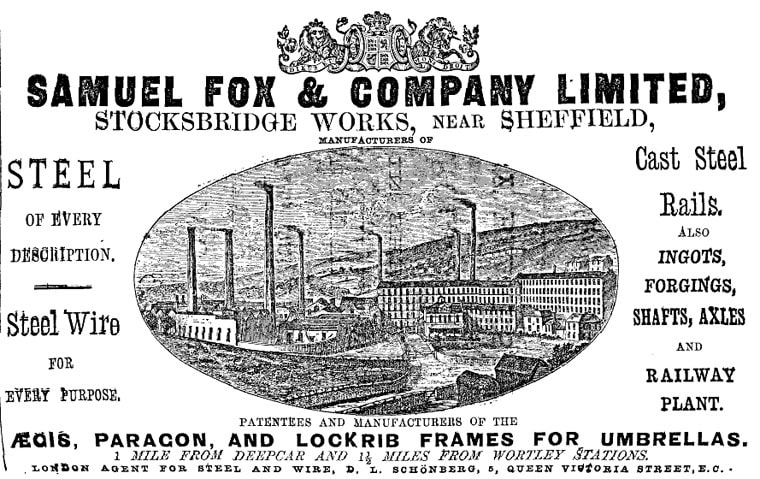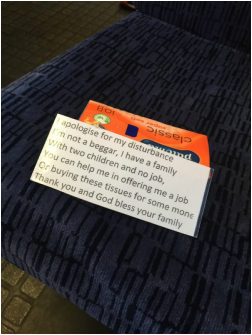,I have been meaning to write this blog for some time now (frequently people ask me why did I call my consultancy 3shifts?) and so, as I sip coffee in a big chain coffee shop which sits on the site of the famous steel works (famous for making umbrellas), in my home town of Stocksbridge (near Sheffield, Yorkshire, UK), there never felt like a more apt time to enjoy my flat white coffee and put pen to paper.
I truly believe that If you have not spoken to a worker who works 3 shifts (a 3-shift pattern – i.e. morning, afternoons and nights) I would go as far to say you are not qualified to do your job in Responsible Sourcing.
I was fortunate to have lived with Alan (my father) growing up. Alan worked his entire working life in a steel factory for 47 years. The same steel factory for 47 years! I was brought up a factory workers daughter in this community, sitting here in this new fancy coffee shop stirs all kinds of emotions for me.
I actually think that my relationship with my father should be on my CV. We are very close and through living with him, I experienced his working life with him. He experienced many violations against international labour standard conventions and it is truly thanks to him that I know how to do my job. He worked 3 shifts.
When he started work here in Stocksbridge Steel works, locally referred to as ‘down t’ yard’ (it wouldn’t feel right to write this blog without some Yorkshire dialect!), my father was only 15 years old. A child. Back in 1962 of course, 15 was a totally acceptable age here in the UK. He had very little training, no health and safety provisions and straight into a steel factory – he was in the wire mill. An unbelievable story really, especially as I look out of the window of the fancy coffee shop.
My father had pay cuts after pay cuts, and at times this led him to strike for many months. My parents struggled during strike time and relied on handouts from family. He absolutely maintains that the 47 years would not have been possible without trade union membership. They helped him fight for what was fair.
He frequently worked excessive hours per week (7 days of 12 hrs at some peaks). Whilst there were weeks and months that I hardy saw my father, these overtime hours were so valuable to enable him to help send me and my brother to further education, especially university. Of course, now on reflection, these hours are not right – but it helps me understand why workers are keen to work long hours when pay isn’t great. They want a better life for their family.
The list of issues goes on and on, and so often I hear similar situations through my work of today. Not only has this life experience given me perspective it gives me passion to help support workers globally to get a fair deal and be treated with respect.
The steelworks here in Stocksbridge were so important for the community and as the industry competed with global markets the pressure inevitably had a negative knock on effect to worker rights and conditions. Ethical behaviour is paramount of course, but we must not ever forget the bigger commercial forces and work with the commercial system to be as accommodating as possible to ensure that industry remains, especially in communities where it is so important. We have the fancy coffee shops now and luckily things have changed here, but the town has had 20 years of deprivation and impoverishment due to the loss of the steel works.
I often wonder through my work as a recruitment consultant if I dare ask my candidates if they understand what working life is like for those in our supply chain. Do they understand what life is like with the challenges faced? We can imagine for sure, but actually hearing the trials and tribulations first-hand is so important to enable us as responsible sourcing professionals to do our job.
So please get out of your office, get to know the workers you so often talk about. Listen and understand. See the big picture of the community and remember that sustainable futures rely on commercial activity. Fight with your passion for what is right and fair and then implement change. Also remember 15 is too young to work in a factory.
Lastly, the name 3shifts is inspired by something my father Alan used to say whenever he saw a white-collar worker - ‘ a bet he dun’t werk three shifts’ (translated as ‘I don’t think they work three shifts’)
Alan Harvey, thankyou for everything. (Alan is now retired, age 72 and still lives in Stocksbridge)
I truly believe that If you have not spoken to a worker who works 3 shifts (a 3-shift pattern – i.e. morning, afternoons and nights) I would go as far to say you are not qualified to do your job in Responsible Sourcing.
I was fortunate to have lived with Alan (my father) growing up. Alan worked his entire working life in a steel factory for 47 years. The same steel factory for 47 years! I was brought up a factory workers daughter in this community, sitting here in this new fancy coffee shop stirs all kinds of emotions for me.
I actually think that my relationship with my father should be on my CV. We are very close and through living with him, I experienced his working life with him. He experienced many violations against international labour standard conventions and it is truly thanks to him that I know how to do my job. He worked 3 shifts.
When he started work here in Stocksbridge Steel works, locally referred to as ‘down t’ yard’ (it wouldn’t feel right to write this blog without some Yorkshire dialect!), my father was only 15 years old. A child. Back in 1962 of course, 15 was a totally acceptable age here in the UK. He had very little training, no health and safety provisions and straight into a steel factory – he was in the wire mill. An unbelievable story really, especially as I look out of the window of the fancy coffee shop.
My father had pay cuts after pay cuts, and at times this led him to strike for many months. My parents struggled during strike time and relied on handouts from family. He absolutely maintains that the 47 years would not have been possible without trade union membership. They helped him fight for what was fair.
He frequently worked excessive hours per week (7 days of 12 hrs at some peaks). Whilst there were weeks and months that I hardy saw my father, these overtime hours were so valuable to enable him to help send me and my brother to further education, especially university. Of course, now on reflection, these hours are not right – but it helps me understand why workers are keen to work long hours when pay isn’t great. They want a better life for their family.
The list of issues goes on and on, and so often I hear similar situations through my work of today. Not only has this life experience given me perspective it gives me passion to help support workers globally to get a fair deal and be treated with respect.
The steelworks here in Stocksbridge were so important for the community and as the industry competed with global markets the pressure inevitably had a negative knock on effect to worker rights and conditions. Ethical behaviour is paramount of course, but we must not ever forget the bigger commercial forces and work with the commercial system to be as accommodating as possible to ensure that industry remains, especially in communities where it is so important. We have the fancy coffee shops now and luckily things have changed here, but the town has had 20 years of deprivation and impoverishment due to the loss of the steel works.
I often wonder through my work as a recruitment consultant if I dare ask my candidates if they understand what working life is like for those in our supply chain. Do they understand what life is like with the challenges faced? We can imagine for sure, but actually hearing the trials and tribulations first-hand is so important to enable us as responsible sourcing professionals to do our job.
So please get out of your office, get to know the workers you so often talk about. Listen and understand. See the big picture of the community and remember that sustainable futures rely on commercial activity. Fight with your passion for what is right and fair and then implement change. Also remember 15 is too young to work in a factory.
Lastly, the name 3shifts is inspired by something my father Alan used to say whenever he saw a white-collar worker - ‘ a bet he dun’t werk three shifts’ (translated as ‘I don’t think they work three shifts’)
Alan Harvey, thankyou for everything. (Alan is now retired, age 72 and still lives in Stocksbridge)







 RSS Feed
RSS Feed
